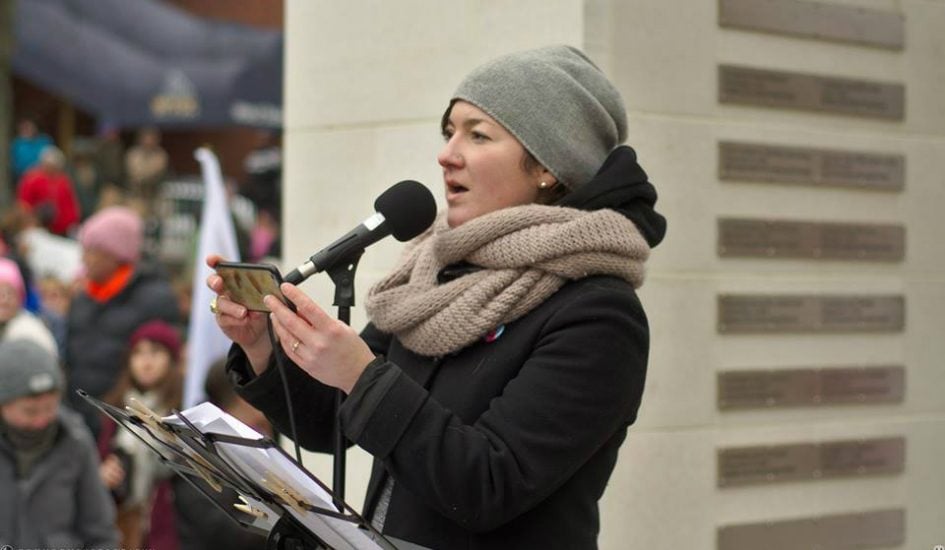KJIPUKTUK (Halifax). Erin Wunker, professor at Acadia University ,and author of Notes from a Feminist Killjoy, speaks at yesterday’s Women’s March rally in Halifax. “What language do we use to refuse what is and imagine what could be?”
Yesterday, Angela Davis tweeted that what was being inaugurated was all of our collective resistances to come.
We gather here today as a means of resistance. We are resisting with our bodies simply by being here. And our bodies do not all look the same. Our lived experiences are not the same. Some of us have more privilege and some of us have less. How, then, do we carry this collective gathering into the future in ethical ways? How do we build collective, allied, and coalitional means of resisting oppressions, especially when those oppressions will get read onto our bodies and written on our skins differently? How do we speak solidarity in the coming days, every day?

I’ve been thinking about the language of resistance. I’ve been thinking about what language we can use to speak collective resistance when the “we” is not necessarily collective. I’ve been thinking about how one can stand in solidarity with others without trying to overshadow or co-opt someone else’s cause as their own.
What language do we use to refuse what is and imagine what could be?
For me, a teacher and student of literature, that language is the language of poetry. Poetry can, I think, move us from where we are into where we could be, even if “we” don’t experience the world in the same way.
Poetry is, I think, the language at the root of political action. Poetry requires that we shift our frames of reference, squint our eyes to see the poet’s message more clearly, or listen with our whole bodies as the poet speaks. Poetry might not be the language of policy change, but can, I think, be the language to foment revolution.
Its significant to me that no Republican president has invited a poet to write and recite an inaugural poem.
Revolution and solidarity are possible. I refuse to believe otherwise.
This is a moment in time—perhaps only the most recent—where we have an opportunity to carefully, consciously and deliberately built communities of coalition and collaboration.
This is a moment in which we are able to really work to learn how to be life-long allies to each other. This is a moment to bear witness and to act.
And this is a moment when those of us with privilege—be it the unearned privilege of whiteness, or class privilege, or heteronormativity, or ability—to fight for the privileges, rights, and dignities of others. It is our responsibility. I refuse to do otherwise. I refuse to do anything other than fight joyfully and in solidarity.
I’d like to close with a poem that offers, I think, the kind of magical thinking that the language of resistance requires. This poem is by Alice Walker, and it is called “We Alone”
Its a poem that takes a collective pronoun “we” and binds it to the word ‘alone’ but instead of leaving people divided in their difference Alice Walker plays around with our expectations. We are not alone as the title suggests.
Rather, We—together, in collaboration for our different needs to live in the world with dignity, rights and respect—we alone are capable of changing the oppressive “what is” into the revolutionary “what could be.” We alone can choose solidarity. I will leave the last words to Alice Walker:
We alone can devalue gold
by not caring
if it falls or rises
in the marketplace.
Wherever there is gold
there is a chain, you know,
and if your chain
is gold
so much the worse
for you.
Feathers, shells
and sea-shaped stones
are all as rare.
This could be our revolution:
to love what is plentiful
as much as
what’s scarce.
Check out the wonderful photos of the Women’s March rally in Halifax posted on Facebook by Foundry Photography.
Please support the Nova Scotia Advocate so that it can continue to cover issues such as poverty, racism, exclusion, workers’ rights and the environment in Nova Scotia.



